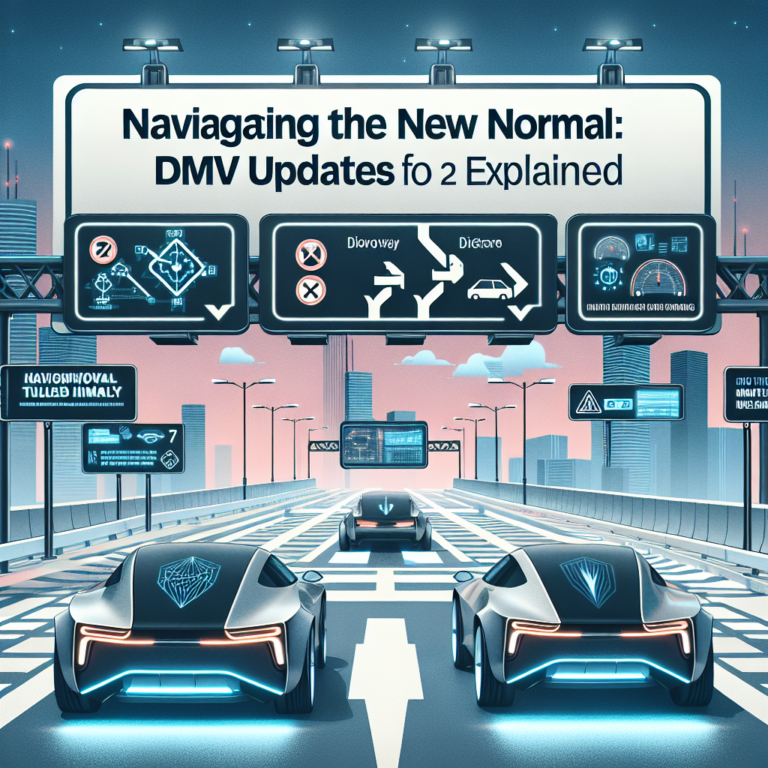Navigating the New Normal: DMV Updates for 2024 Explained
As we venture into 2024, the landscape of government services, particularly in the realm of motor vehicle departments (DMVs), continues to evolve due to the lasting impacts of the COVID-19 pandemic, advances in technology, and changing consumer expectations. These updates reflect a commitment to enhancing service efficiency, improving safety, and adapting to the needs of residents. Here’s a breakdown of significant DMV updates for 2024 and what they mean for you.
1. Increased Online Services
In response to the pandemic, many DMVs expanded their online services, and this trend is set to continue into 2024. Most states now allow residents to handle a variety of DMV-related tasks from the comfort of their homes:
- Driver’s License Renewals and Replacements: Many states have streamlined the renewal process, allowing residents to process their renewals online without needing to visit a physical office. This includes temporary digital licenses in some areas.
- Vehicle Registration: Options for online registrations and renewals are becoming standard, with user-friendly interfaces guiding residents through the process.
- Appointment Scheduling: To manage foot traffic and reduce wait times, many DMVs have implemented advanced online appointment systems, allowing customers to choose specific times for in-person visits.
2. Enhanced Safety Protocols
The health and safety of residents remain a top priority. As a result, DMVs have instituted updated protocols to ensure safe environments for both employees and customers:
- Mask Mandates and Hygiene Protocols: Depending on local COVID-19 guidelines, mask mandates may still be in effect in some locations. Regular sanitation of facilities has become standard practice.
- Social Distancing Practices: Many offices have rearranged wait areas and service desks to comply with social distancing guidelines, reducing the number of individuals allowed in waiting areas at one time.
3. Digital Identification Solutions
Recognizing the need for contactless identification, states are advancing their initiatives towards digital IDs:
- Mobile ID Applications: Some DMVs have launched mobile apps that provide a digital version of your state-issued ID. While laws regarding the acceptance of digital IDs vary, this feature is rapidly gaining acceptance among businesses and law enforcement.
- Easier Access to Records: Residents now have improved access to their driving histories and personal records online, enabling them to manage their documents more effectively.
4. Extension of Grace Periods
Understanding the financial challenges many have faced post-pandemic, several DMVs are extending grace periods for renewals and other time-sensitive services:
- License and Registration Extensions: Some states have implemented longer grace periods for expired licenses and vehicle registrations, alleviating pressures on residents dealing with economic repercussions from the pandemic.
- Fines and Fees Adjustments: In 2024, certain DMVs may also offer waivers or reductions on late fees for renewals that missed deadlines during the pandemic.
5. Emphasis on Sustainable Practices
In alignment with global sustainability goals, DMVs are increasingly prioritizing eco-friendly initiatives:
- Electronic Paperwork: The push towards paperless transactions is stronger than ever, with an emphasis on electronic titles and registrations to reduce the environmental impact.
- Green Vehicle Initiatives: Some states are enhancing incentives for electric vehicles, promoting the adoption of cleaner transportation options as part of their commitment to sustainability.
6. Technology Integration and Innovations
The adoption of new technologies continues to revolutionize DMV operations:
- Artificial Intelligence (AI): Some states are incorporating AI-driven chatbots on their websites, providing instant assistance for common inquiries, guiding users through processes, and reducing the strain on customer service representatives.
- Mobile Vehicle Inspections: Programs for mobile inspections through certified vendors are being tested, allowing vehicle owners to meet inspection requirements without visiting a physical site, improving convenience and accessibility.
Conclusion
As we move forward in 2024, these DMV updates signify a shift towards a more efficient, accessible, and user-friendly approach to vehicle registration, licensing, and related services. The drive for innovation, safety, and sustainability aligns DMVs with the new normal that residents have come to expect. As always, it’s essential for drivers to stay informed about changes that may affect their responsibilities and resources. With these guidelines in place, navigating your local DMV is set to be a more manageable and streamlined experience.


